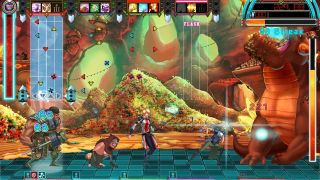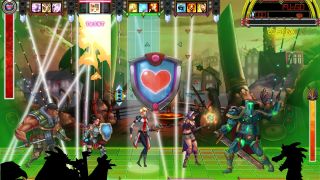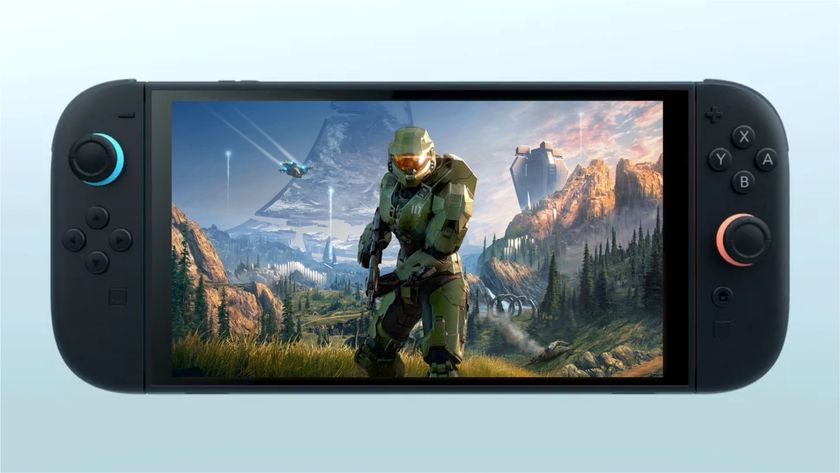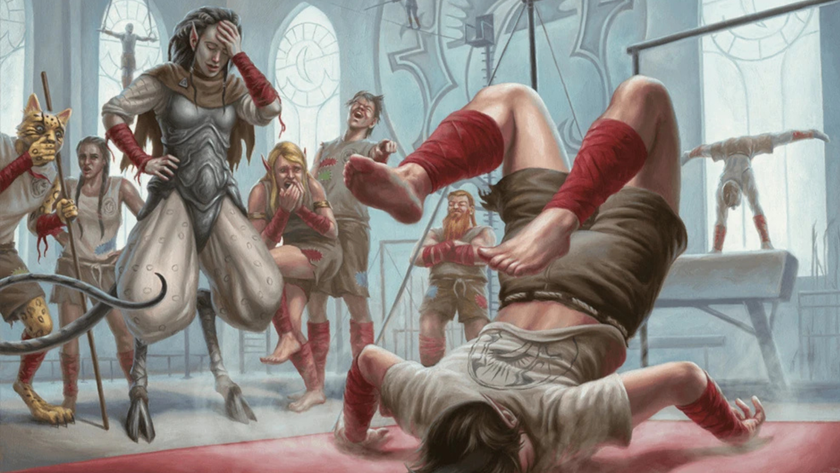The Metronomicon brilliantly combines dance battles and boss battles
The Metronomicon is basically the 'peanut butter and chocolate' of indie games. It takes two great tastes - rhythm games and RPGs - and smashes them together in an unlikely concoction that works way better than it should, offering the great tunes you'd expect of the former with all the depth and customizability of the latter. I played a small sample of it at PAX East and was pretty impressed with what I saw, but I didn't really get a chance to see how all of its moving parts fit together. Luckily, Danny Garfield, one of the masterminds behind The Metronomicon, gave me an extensive look at how its RPG elements work at E3, and I have to say that I was not expecting it to be as deep and rewarding as it actually is.
The Metronomicon tells the story of a bunch of young students learning how to harness their latent musical abilities while a series of dance parties have sprung up around them, causing demons to pour forth and harsh on everyone's buzz. It's a strange, cartoonish set-up, and the bright colors, goofy enemy design, and copious amount of strobe lights all come together to really sell this RPG rave-off. I mean, one of the game's forms of currency is called 'Street Creds'. I love it.
There's a lot to take in (especially when the developer gives you all of the late-game gear, skills, and character classes to mess around with), but the sheer act of battling is relatively simple. You control up to four party members, and as each level's song begins, notes begin raining from the sky in each character's 'lane', similar to a multiplayer game of Dance Dance Revolution. Using a combination of D-pad and face button presses, you'll want to keep time with the music, tapping buttons along with the beat and building up your streak. Perform well enough, and you'll be able to cast that party member's first ability by switching lanes - or you can keep the streak going, and access higher tiers of abilities. There's an inherent risk and reward system in place here. Do you get a couple quick attacks in, or do you hope you can hold out for a bigger, potentially game changing blast? The song's length effectively acts as a level timer, as you try to take out as many enemies - along with the boss - before the song ends. Doing so quickly ensures that you get a ton of rare loot to sift through once you're done.
That much is simple - but there are layers upon layers of complexity to give you a ton of freedom to customize your loadouts before a battle, and to tailor your strategy once you're in the thick of a four-on-the-floor banger. There's your gear, which not only affects attack and defensive stats, but also grants you special abilities - like mystic armor, which activates game-changing powers once you hit a certain note streak in a given song. There's your party, which is made up of a bunch of familiar RPG classes - the medic is your healer, the paladin is a tank meant to absorb damage, etc. - but all of their abilities are tweaked to fit the context of rhythm-game battles. The druid, for instance, is all about buffing your players with stronger attacks, but is also able to reduce the amount of notes that appear in a given section - perfect for nailing those tricky, finger-twisting bits. Enemies can also de-buff your party, causing notes to turn black (making it harder to differentiate between quarter- and eighth-notes on screen), or start rotating wildly. Enemies also have elemental affinities you need to consider when powering up your attacks, you can level up abilities by earning materials and XP, and on, and on, and on.

And that's just within the confines of a normal stage in one of The Metronomicon's 50 story missions. That's saying nothing of the side quests that pop up between songs, allowing you to earn rare gear by playing within certain constraints (one in particular forces you to get as high a score as possible using nothing but healing abilities). Or the Arena, which throws the game's most difficult challenges at you (like one level which turns every note into a devastating meteor, effectively requiring you to get damn-near perfect streak to survive). Or the daily challenges with built-in leaderboards. Or the ability to upgrade and build out your home base with the Street Creds you earn.
After the relative simplicity of the PAX East demo, I was completely overwhelmed by the amount of options available at a given moment and by how deep the RPG rabbit hole really went. I found myself getting trounced by difficult enemies because I haven't absorbed what ability icons do what, how best to react to specific attacks, and so on - I just did my best to keep up with the songs and try to get a few hits off when I could. Eventually, I started to notice how powers chained - a buff from the warrior here, a proper elemental attack from my wizard there, and I eventually started settling into the groove of combat as much as I was swaying to the music. I was assured players will be eased into all of this over the course of The Metronomicon's story, beginning with only a handful of skills and party members and eventually blossoming into the full end-game content (unlike me, who was essentially thrown into the deep-end and told how to swim). Plus, there's an arcade mode available on the main menu, allowing players to quickly dive into any unlocked song with a pre-made party - as good a way to practice tricky songs as it is to compete on the global leaderboards.

Oh, speaking of songs (because, don't forget, it's a rhythm game), the set-list is pretty fantastic from what I've seen. It's a melange of electronic music genres, from Perturbator's 80s-synth dread, to bouncy chiptunes, to disco, to dubstep, to an exclusive track from Johnny Urine of Mindless Self-Indulgence fame (a name I haven't heard since I was in high school over a decade ago). Make no mistake: The Metronomicon may look like a simple, arcadey button-tapping rhythm game, but there's a ton of depth here for RPG min/maxers to really sink their teeth into, and you'll get to jam out to some great music while you do it. Look for it later this year on PC, with console releases to follow.
Sign up to the 12DOVE Newsletter
Weekly digests, tales from the communities you love, and more

Former Nintendo marketing leads say the Wii U flopped so bad that getting third-party support on Switch was "really hard," but the Switch 2 marks a new era: "There's no more proving yourself"

The Baldur's Gate 3-themed Stardew Valley mod that Larian boss Swen Vincke called "amazing" gets DMCA'd by D&D publisher Wizards of the Coast











